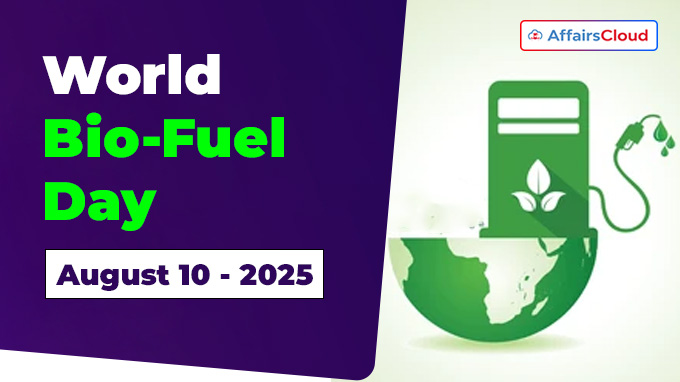 World Biofuel Day is observed every year on 10th August worldwide to spread awareness about the benefits of using non-fossil fuels (green fuels) instead of traditional fossil fuels. Biofuels are seen as a cleaner and more sustainable energy option.
World Biofuel Day is observed every year on 10th August worldwide to spread awareness about the benefits of using non-fossil fuels (green fuels) instead of traditional fossil fuels. Biofuels are seen as a cleaner and more sustainable energy option.
- The day focuses on how biofuels are renewable, eco-friendly, and help reduce greenhouse gas (GHG) emissions.
- It also honours Rudolf Christian Karl Diesel, the French-German engineer who invented the diesel engine (also called the Compression Ignition engine) in the 19th century.
Exam Hints:
- Event: World Biofuel Day 2025
- Date & Significance: 10 August; marks Rudolf Diesel’s peanut-oil-powered engine test in 1893.
- Purpose: To spread awareness about the benefits of using non-fossil fuels (green fuels)
- India’s Observer:The Ministry of Petroleum and Natural Gas(MoP&NG) since 2015
- India: 3rd largest oil consumer.
- Ethanol Production: 1,528 crore litres (2024); target 1,700 crore litres for E20 blending by 2025.
Background: Since 2015, the Ministry of Petroleum and Natural Gas (MoP&NG), Government of India(GoI), has been observing World Biofuel Day.
- The aim is to promote the use of blended biofuel in India.
- India is the third-largest oil consumer in the world, after the United States and China.
Significance for August 10: On 10 August 1893, Rudolf Diesel demonstrated his first Diesel engine in Augsburg, Germany. It was powered by peanut oil (a biofuel).
- The engine was a 3-meter (10 feet) iron cylinder with a flywheel at its base.
Biofuel:
Definition: Biofuel is a fuel made from biomass, which includes plant material (like sugarcane, corn, soybeans, and algae), agricultural residues, or animal waste
Benefits: It serves as a cost-effective, renewable, and environmentally friendly alternative to fossil fuels, helping reduce greenhouse gas (GHG) emissions and reliance on oil.
Feedstocks: Common crops used in biofuel production include sugarcane, maize (corn), soybean, and sunflower. These are rich in sugar, starch, or oil content.
Factors: Fossil fuels such as coal, oil, and gas are the leading contributors to global climate change. They produce over 75% of greenhouse gas (GHG) emissions and account for nearly 90% of all carbon dioxide (CO₂) emissions.
Types: Ethanol and biodiesel are the two most common and belong to the first generation of biofuels, made from crops like seeds, grains, and sugar-rich plants.
Ethanol (CH₃CH₂OH)
- A renewable alcohol fuel made from plant biomass such as sugarcane, grains, or other organic materials. Blended with petrol to improve octane and reduce emissions.
Biodiesel
- A cleaner-burning diesel alternative produced from vegetable oils or animal fats. It is non-toxic, biodegradable, and reduces air pollutants compared to petroleum diesel.
India’s Ethanol Production Milestone
Ethanol Production Capacity: Increased to 1,528 crore litres (2024) from 1,380 crore litres (November 2023); target 1,700 crore litres for 20% blending (E20) by 2025.
Biodiesel Blending: Target 5% by 2030; current 0.5% with 23 crore litres used in 2023–24.
Ethanol Blending Rate: Reached 16.9% toward the 20% goal by 2025–26.
Foreign Exchange Savings: Rs. 1.06 lakh crore saved (2014–Aug 2024) via ethanol blending; CO₂ emissions reduced by 544 lakh tonnes.
Government Initiatives:
Pradhan Mantri JI-VAN (Jaiv Indhan-Vatavaran Anukool fasal awashesh Nivaran) Yojana: The scheme allocates Rs. 1,969.50 crore (2018–24) for 12 integrated bio-ethanol projects; extended till 2028–29 for advanced biofuels from biomass, waste, and algae.
Second-Generation (2G) Ethanol: Sustainable Innovation
India’s 2G ethanol made from non-food sources like rice straw, to tackle the food-versus-fuel issue. The country’s first commercial 2G ethanol plant, located in Panipat, Haryana, converts agricultural residue into fuel linking waste management with energy production.
Global Biofuel Alliance (GBA): India’s Climate Leadership
Launched during India’s G20 Presidency (September 9, 2023); now 22 member countries & 12 international organisations; Secretariat to be based in India.
- Recently, the GBA has signed a Host Country Agreement with India to establish its Secretariat on Indian soil, bolstering domestic biofuel policy influence and aiding global coordination.
Events in India – 2025:
Public Awareness Through Interactive Events: On August 10, 2025, India marked World Biofuel Day with seminars, exhibitions, and school competitions promoting bioethanol, biodiesel, biogas, and biohydrogen, raising awareness among communities and students about sustainable energy solutions.
Industry Dialogue Advances Sustainable Mobility: On August 11, 2025, the SIAM (Society of Indian Automobile Manufacturers) 4th International Conference on World Biofuel Day was held in New Delhi(Delhi), uniting experts to discuss biofuel technologies, future trends, and policy actions for sustainable transportation.




